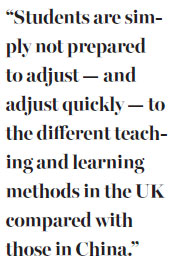Chinese must adapt to UK 'study shock'
Updated: 2016-04-15 08:53
By Philip Morgan(China Daily Europe)
|
|||||||||

Universities and recruitment agencies need to do more to help students acquire key skills well ahead of their arrival
With thousands of Chinese students planning to study at foreign universities this year, the one big question is: are they sufficiently prepared? The answer is probably not.
Last year, more than 520,000 Chinese went abroad to study, with about 90,000 choosing educational institutions in the United Kingdom.
According to China's Ministry of Education, 97 percent of these students finance their own overseas studies, or at least their families do.
Tuition represents a significant income stream for higher-education institutions in the UK, where the average annual cost for an international student at undergraduate level is 11,987 pounds ($16,900; 14,800 euros). At postgraduate level, that rises to 12,390 pounds.
Combine these fees with the average cost of living, which is about 12,000 pounds, and the total comes to at least 24,000 pounds a year to study in the UK. For Chinese parents who send their sons and daughters abroad, this represents a significant financial investment.
But while the numbers of Chinese students attending UK universities is a success story, new research shows that when it comes to academic attainment, the picture is not so good.
According to the latest figures from the UK Higher Education Statistics Agency, nearly 68 pe

rcent of all students - and 52 percent of overseas students from outside the European Union - graduated with a first or 2.1 last year. For Chinese students, it was just 42 percent.
I know from experience in the UK that many students from China are simply overwhelmed on their arrival. And who can blame them? They have to come to grips with many issues before they even start thinking about their chosen study program.
Although all will have achieved the required level of written and spoken English for entry to a British university, it is a very different matter from having to speak and read every day in English.
Another priority is finding suitable and affordable accommodation; again, not always easy. Students also have to get used to living in and adapting to a diverse and different culture and environment - and importantly need to make new friends.
There is so much to do and think about in a relatively short space of time. It's a lot for anyone to take in all at once.
Many universities and education recruitment companies are doing their best to help Chinese students to manage what for many is a difficult and stressful transition. There are induction courses to help orientate international students, and there are also presession courses in English to help students better prepare for the amount of reading and written work required.
Despite all this, students are simply not prepared to adjust - and adjust quickly - to the different teaching and learning methods in the UK compared with those in China.
In April last year, Gu Qing, a professor at the University of Nottingham, wrote in a China Daily article: "Unfamiliarity with the pedagogical traditions in UK institutions was found to have contributed to a 'learning shock' that many Chinese students experienced, especially at the beginning of their studies".
Studying in the UK requires a student to learn a completely different set of study skills. For example, written assignments (essays, dissertations, projects or reports) have to be well written, structured and argued, as most of the marks awarded are based on written work. Other things to think about are how to use information and data, avoiding plagiarism, listening and presentation skills, speed-reading and effective note-taking, problem-solving, effective research, group and individual working, and time management.

Being familiar with these study skills will make the learning process much easier for Chinese students.
Some students are better able to manage these changes than others. However, with so much more information to process before a course has even started, having a good understanding of the different skills needed for effective study is not always a priority for them. But it should be.
It becomes a priority when a student is faced with the first written assignment - and then panic sets in. This can often lead to unnecessary stress and possibly a lower mark, which in turn leads to a lower final academic result than expected.
To compensate, Chinese students who are under pressure tend to stick together and, by doing so, miss out on the hidden benefits of studying and sharing ideas with people from different countries and cultures.
There is also a real danger that a desperate student falls into the trap of using the work or ideas of others without acknowledging the source of information. Plagiarism, conscious or unconscious, is treated very seriously, and plagiarized work is usually disqualified.
According to a report by the US Institute of International Education, about 8,000 of the more than 274,000 Chinese students enrolled for the 2013-2014 academic year were disqualified - 23 percent for academic dishonesty, including plagiarism.
It doesn't have to be like this. The situation is complex and the differences in academic performance cannot be attributed to a radically different culture and linguistic background alone. However, failure to adapt quickly to a different set of study skills places Chinese students at a significant disadvantage.
Of course, students and their families can do more to prepare for overseas study. But organizations such as universities and recruitment agencies, which clearly benefit from Chinese students, also need to do much more to help students acquire these key study skills - and well ahead of their arrival in the UK.
After all, Chinese families are investing significant amounts in the future of their children and have a right to expect a positive outcome, value for money and the promise of enhanced job prospects from their studies overseas.
The author is a former senior policy adviser to the UK government on education links with China and a former first secretary in the British embassy in Beijing. For more information, visit www.morganseares.co.uk. The views do not necessarily reflect those of China Daily.
Today's Top News
Inspectors to cover all of military
Britons embrace 'Super Thursday' elections
Campaign spreads Chinese cooking in the UK
Trump to aim all guns at Hillary Clinton
Labour set to take London after bitter campaign
Labour candidate favourite for London mayor
Fossil footprints bring dinosaurs to life
Buffett optimistic on China's economic transition
Hot Topics
Lunar probe , China growth forecasts, Emission rules get tougher, China seen through 'colored lens', International board,
Editor's Picks

|

|

|

|

|

|







